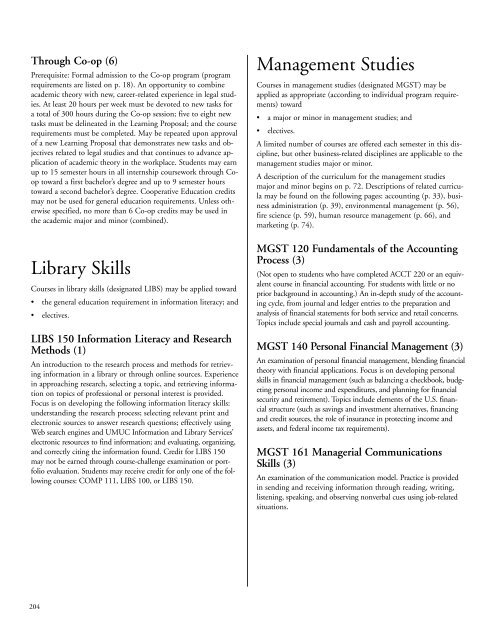1a. IntroSUS 2003 - University of Maryland University College
1a. IntroSUS 2003 - University of Maryland University College
1a. IntroSUS 2003 - University of Maryland University College
- No tags were found...
Create successful ePaper yourself
Turn your PDF publications into a flip-book with our unique Google optimized e-Paper software.
Through Co-op (6)Prerequisite: Formal admission to the Co-op program (programrequirements are listed on p. 18). An opportunity to combineacademic theory with new, career-related experience in legal studies.At least 20 hours per week must be devoted to new tasks fora total <strong>of</strong> 300 hours during the Co-op session; five to eight newtasks must be delineated in the Learning Proposal; and the courserequirements must be completed. May be repeated upon approval<strong>of</strong> a new Learning Proposal that demonstrates new tasks and objectivesrelated to legal studies and that continues to advance application<strong>of</strong> academic theory in the workplace. Students may earnup to 15 semester hours in all internship coursework through Cooptoward a first bachelor’s degree and up to 9 semester hourstoward a second bachelor’s degree. Cooperative Education creditsmay not be used for general education requirements. Unless otherwisespecified, no more than 6 Co-op credits may be used inthe academic major and minor (combined).Library SkillsCourses in library skills (designated LIBS) may be applied toward• the general education requirement in information literacy; and• electives.LIBS 150 Information Literacy and ResearchMethods (1)An introduction to the research process and methods for retrievinginformation in a library or through online sources. Experiencein approaching research, selecting a topic, and retrieving informationon topics <strong>of</strong> pr<strong>of</strong>essional or personal interest is provided.Focus is on developing the following information literacy skills:understanding the research process; selecting relevant print andelectronic sources to answer research questions; effectively usingWeb search engines and UMUC Information and Library Services’electronic resources to find information; and evaluating, organizing,and correctly citing the information found. Credit for LIBS 150may not be earned through course-challenge examination or portfolioevaluation. Students may receive credit for only one <strong>of</strong> the followingcourses: COMP 111, LIBS 100, or LIBS 150.Management StudiesCourses in management studies (designated MGST) may beapplied as appropriate (according to individual program requirements)toward• a major or minor in management studies; and• electives.A limited number <strong>of</strong> courses are <strong>of</strong>fered each semester in this discipline,but other business-related disciplines are applicable to themanagement studies major or minor.A description <strong>of</strong> the curriculum for the management studiesmajor and minor begins on p. 72. Descriptions <strong>of</strong> related curriculamay be found on the following pages: accounting (p. 33), businessadministration (p. 39), environmental management (p. 56),fire science (p. 59), human resource management (p. 66), andmarketing (p. 74).MGST 120 Fundamentals <strong>of</strong> the AccountingProcess (3)(Not open to students who have completed ACCT 220 or an equivalentcourse in financial accounting. For students with little or noprior background in accounting.) An in-depth study <strong>of</strong> the accountingcycle, from journal and ledger entries to the preparation andanalysis <strong>of</strong> financial statements for both service and retail concerns.Topics include special journals and cash and payroll accounting.MGST 140 Personal Financial Management (3)An examination <strong>of</strong> personal financial management, blending financialtheory with financial applications. Focus is on developing personalskills in financial management (such as balancing a checkbook, budgetingpersonal income and expenditures, and planning for financialsecurity and retirement). Topics include elements <strong>of</strong> the U.S. financialstructure (such as savings and investment alternatives, financingand credit sources, the role <strong>of</strong> insurance in protecting income andassets, and federal income tax requirements).MGST 161 Managerial CommunicationsSkills (3)An examination <strong>of</strong> the communication model. Practice is providedin sending and receiving information through reading, writing,listening, speaking, and observing nonverbal cues using job-relatedsituations.204

















